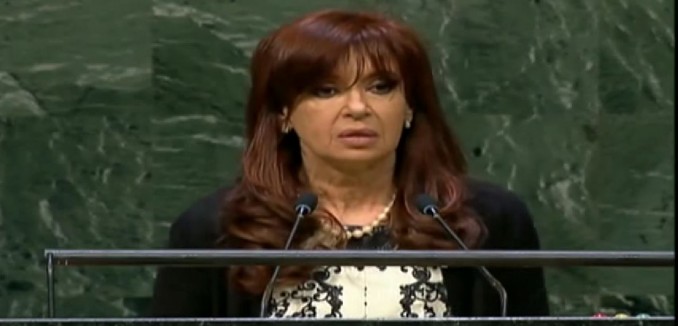President Cristina Fernandez de Kirchner of Argentina was accused by a state prosecutor Wednesday of covering up Iran’s involvement in 1994 bombing of the AMIA building, the deadliest anti-Semitic attack since the Holocaust, in order to strengthen ties between Buenos Aires and Tehran.
Special prosecutor Alberto Nisman cited phone taps as evidence that Kirchner, who seeks to import Iranian oil to narrow her country’s $7 billion per year energy gap, has been pressuring to drop the investigation into Iran’s role in the attack, which left 85 dead.
According to Reuters:
Nisman said he issued a request that a judge interrogate Fernandez and Foreign Minister Hector Timerman “for being authors and accomplices of an aggravated cover-up and obstruction of justice regarding the Iranians accused of the AMIA terrorist attack.”
Argentine courts accuse Iran of sponsoring the bombing. Iran, in preparatory talks with the United States to end its standoff with world powers over its nuclear program, denies links to the attack.
Two years ago President Fernandez signed a “truth commission” agreement with Iran for the two countries to jointly investigate the attack, but this move was later declared unconstitutional by an Argentine court after harsh denunciations from Argentine Jewish groups. Nisman accused Fernandez of using the commission as a way to get charges against Iran dismissed and fully normalize relations.
Nisman’s legal brief contains transcripts of wiretaps featuring government ministers allegedly arranging with Mohsen Rabbani, a fugitive who at the time of the attack was Iran’s cultural attache in Buenos Aires and has since become a principal suspect, to trade Iranian oil for Argentinian grain on the orders of President Kirchner. The Algemeiner had more:
Some of Nisman’s evidence was culled from phone taps which came into his possession. One transcript revealed [Luis] D’Elia, a former member of Kirchner’s cabinet, telling Rabbani by telephone, “I have an urgent message from the Argentine government to urgently send over to Tehran before tomorrow. I am in Government House right now. There is no matter of greater importance than this, believe me when I tell you.”
According to Nisman, his complaint “presents irrefutable evidence that Cristina Fernández de Kirchner ordered Federal Planning Minister Julio De Vido to meet with D’Elia, and through him, to transmit the government’s interest in swapping grain for oil.”
In Has Argentina Turned Against its Jews?, which was featured in the October 2014 issue of The Tower Magazine, Eamonn MacDonagh described the lack of interest in finally confronting the attack’s true culprits:
It seems that, twenty years after it occurred, the AMIA massacre is and will remain an unsolved crime, while the president of Argentina sees fit to wonder in public whether the Jewish community might all along have been looking, not for justice, but to single-handedly start a war with Iran.
How Argentina reached such a nadir is a long story, but it is worth telling; if only as an object lesson in what not to do when confronting Iranian terrorism. It is also, unfortunately, a depressing tale of just how difficult it is to obtain justice for victims of terrorism when those victims happen to be Jews.
[Photo: Casa Rosada / YouTube]




